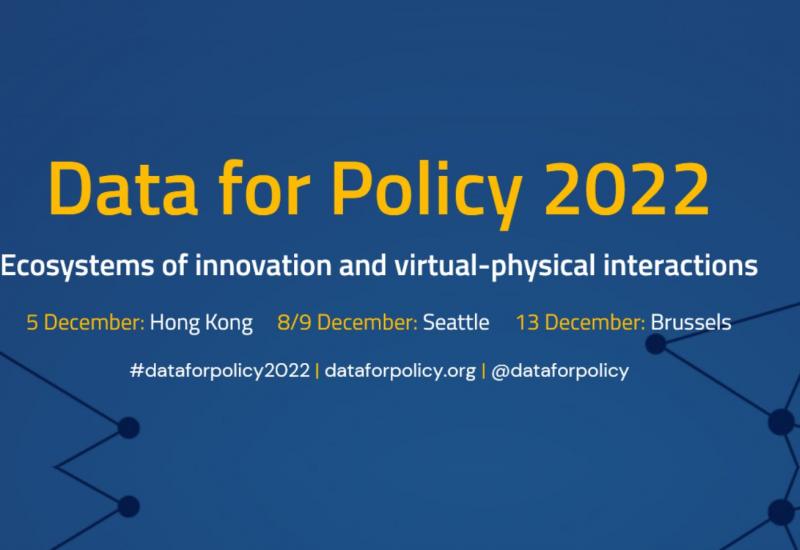
- Cloud for Data-Driven Policy Management
- Contact Us
- Join our community
- Login
Data for Policy 2022
The Data for Policy 2022, the seventh edition of the conference, highlights “Ecosystems of innovation and virtual-physical interactions” as its theme. The conference is the premier global forum for multiple disciplinary and cross-sector discussions around the theories, applications and implications of data science innovation in governance and the public sector. Its associated journal, Data & Policy, published by Cambridge University Press has quickly established itself as a major venue for publishing research in the field of data-policy interactions. This year's conference will embrace a hybrid physical-virtual format, with one-day, in-person conferences held in three regions:
- Asia (Hong Kong) – 5 December 2022
- America (Seattle) – 9 December 2022
- Europe (Brussels) – 13 December 2022
The pan-European projects dedicated to using the cloud for a data-driven policy called the “Data Driven Policy Cluster” will be taking part in the Data for Policy 2022 taking place on 13 December in Brussels.
Data usage improves public policies & policymaking
The convergence of Cloud, Big Data and AI has already resulted in major transformation across Government services, yet the process of policy making itself is often left behind. Digital technologies have changed the world. Today people expect faster, seamless, on-demand services from their providers, and the government is no exception. For effective urban operations which make life easier for residents, workers and visitors, public sector decision-making needs to become more agile. Breaking down data silos to combine day-to-day tactical decisions with longer-term policies and strategies. Disruptive technologies such as Digital Twins, Artificial Intelligence (AI) and High Performance Computing (HPC) unlock new opportunities for sustainable decision-making through visualisations, simulations and predictions that enhance transparency, increase public support and involvement, and optimise resources.
To support this transformation AI4PublicPolicy, DECIDO, Intelcomp, DUET and Policy Cloud, pan-European projects dedicated to using the cloud for data-driven policy, have joined forces in the ecosystem of innovation called the Data Driven Policy Cluster. Together they explore major challenges, trends and opportunities to improve public sector decision-making that will deliver healthier, happier places to live and work.
The cluster has published a series of policy briefs, providing recommendations for policymakers on:
- Governance Ethics for Evidence-Based Policymaking
- Policy Prediction, the Future of Evidence-Based Policymaking
- Co-Creation and Stakeholder Engagement for Evidence-Based Policymaking
Now, in this virtual-physical interaction, the Data Driven Policy Cluster will put their data usage to improve public policies and policymaking to the test in an interactive and feedback-gathering discussion with researchers and policymakers at the Data for Policy conference.
AI4PublicPolicy, DECIDO, IntelComp and Policy Cloud are implementing policy prediction tools locally, set in urban, social, S&T, and environmental contexts.
The discussion will dive deep into data usage advancing policymaking and the policymaking lifecycle across the cluster projects. This will be done by addressing pillar activities and mapping commonalities:
- Cross-domain data usage
- Policy prediction tools
- Co-creation for evidence-based policymaking
- Incentives management and envisioned impact
The Data Driven Policy Cluster will illustrate the implementation and impact of their tools and methods in a number of pilots, and validate the presented solutions with the Data for Policy audience of researchers and policymakers.
The discussion will take stock of how each project in the Data Driven Policy Cluster boosts evidence-based policymaking, lessons learned from implementation, feedback from the Data for Policy audience and finally work towards the definition of shared recommendations for potential cross-project and cross-pilot data usage.
About the Panel
The Data Driven Policy Cluster will be represented by:
- AI4PublicPolicy
- A joint effort of policy makers and Cloud/AI experts to unveil AI’s potential for automated, transparent and citizen-centric development of public policies. To this end, the project will deliver, validate, demonstrate and promote a novel Open Cloud platform for automated, scalable, transparent and citizen-centric policy management based on unique AI technologies. The AI4PublicPolicy platform will be an Open Virtualized Policy Management Environment (VPME) that will provide fully-fledged policy development/management functionalities based on AI technologies, while leveraging citizens’ participation and feedback. It will support the entire policy development lifecycle, based on technologies for the extraction, simulation, evaluation and optimization of interoperable and reusable public policies, with emphasis on citizen-centric policies development and optimization through the realisation of citizen-oriented feedback loops. The AI4PublicPolicy VPME will be integrated with the European Open Science Cloud (EOSC) with the dual objective to facilitate access to the Cloud and HPC resources that are required to enable the project’s AI tools, and to boost the sustainability and wider use of the project’s developments.
- DECIDO
-
The eviDEnce and Cloud for more InformeD and effective pOlicies. The project will demonstrate the groundbreaking impact of the adoption of innovative methodologies, tools and data enabling the effective development of better evidence-based policies by public authorities, creating a bridge between Public Authorities and European Open Science Cloud to widen the use of the European Cloud Infrastructure services and data to Public Administrations.DECIDO experiments and validates its approach and tools in the domain of disaster risk management. In particular, the trial will take place in Turin area (Italy) for floods, Aragon region (Spain) for wildfires, Greek municipalities for power outage and Kajaani area (Finalnd) for forest fire.DECIDO will serve as an intermediary between the public sector, the citizen science world and the European Cloud Infrastructure (ECI) through the direct collaboration with EOSC and will provide storage capacity and processing power through EGI infrastructure.
- IntelComp
-
Develops a Competitive Intelligence Cloud/HPC Platform for AI-based Science, Technology and Innovation Policy-Making. Multi-disciplinary teams will co-develop analytics services, Natural Language Processing pipelines and AI workflows, exploiting EOSC open data and resources, HPC environments and federated operations at the EU, national and regional level. Ensuring a cooperative environment, different actors visualise, interact and analyse information. Through co-creation, IntelComp will adopt a living labs approach, engaging public policy makers, academia, industry, SMEs, local actors and citizens to explore, experiment with and evaluate STI policies. IntelComp is targeting domains aligned with the European Agenda and the Horizon Europe Missions: AI, Climate Change and Health.
- PolicyCloud
-
The project exploits the potential of digitisation, big data and cloud to improve the modelling, creation and implementation of policies. Delivering a unique, integrated environment of datasets, data management, and analytic tools it addresses the full lifecycle of policy management. The cloud environment for data-driven policy management is practically demonstrated via a co-creative process in three thematically distinct pilots. Each of them run in three European regions: Policies against Radicalisation in the Lombardy Region, Intelligent policies for the food-value chain in Aragon, and Urban policy making through analysis of crowdsourced data in Sofia. The project empowers citizens to contribute to data and policies related to their everyday-life. The solutions and tools developed by Policy Cloud will eventually become available from the EOSC, as public cloud services.
To register and learn more about the event, visit the official event page: https://dataforpolicy.org/data-for-policy-2022/
- 5989 reads


